SingaporeMotherhood | Parenting
April 2024
Wings of Change: Judith’s Fight for Her Special Needs Child Creates Ripples of Hope across Asia
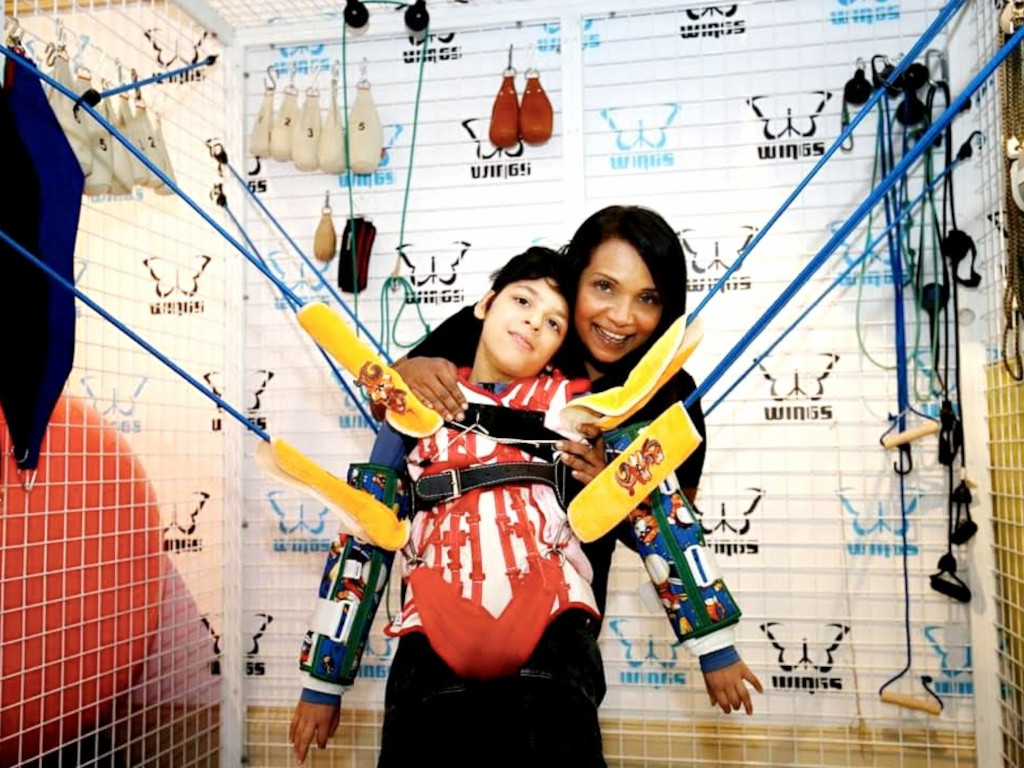
Describing herself as fiercely independent, passionate, full of energy, and somewhat rebellious, Judith Julia Justin grew up in the local Singaporean education system. After completing her university education in Australia, she spent over 15 years in the public relations and branding industry. Today, 50-year-old Judith is the owner and CEO of WINGS, a rehabilitation centre for special needs children, where she also works as a coach for kids with severe disabilities.
“I was none of these before I became a mother to my beautiful son Jake,” Judith shares. “By this twist of fate, I found my passion in contributing to the special needs community in Singapore and Asia. I used to wonder what purpose my son’s condition could possibly have, but as I’ve grown on this journey, I realised WINGS was my answer. Together with Jake, my life’s mission is to help as many parents and kids as possible find hope despite their conditions.
(See also: 7 FIRST-RATE ENRICHMENT PROGRAMMES FOR SPECIAL NEEDS CHILDREN IN SINGAPORE)
From Excitement to Uncertainty
Becoming a parent was all a rush back then. I was juggling a full-time corporate career and travelling the world. Then I married and had my first child in my early 20s, and two more kids before the age of 33.
My eldest, Jasmine, was eight when I unexpectedly got pregnant with Jake. At the time, I was travelling everywhere, balancing a full social calendar and an exciting career. My pregnancy was smooth in the first two trimesters. I remember going on a girls’ trip to New York in my fourth month and being physically active throughout my pregnancy. I was told that my baby and I were healthy.
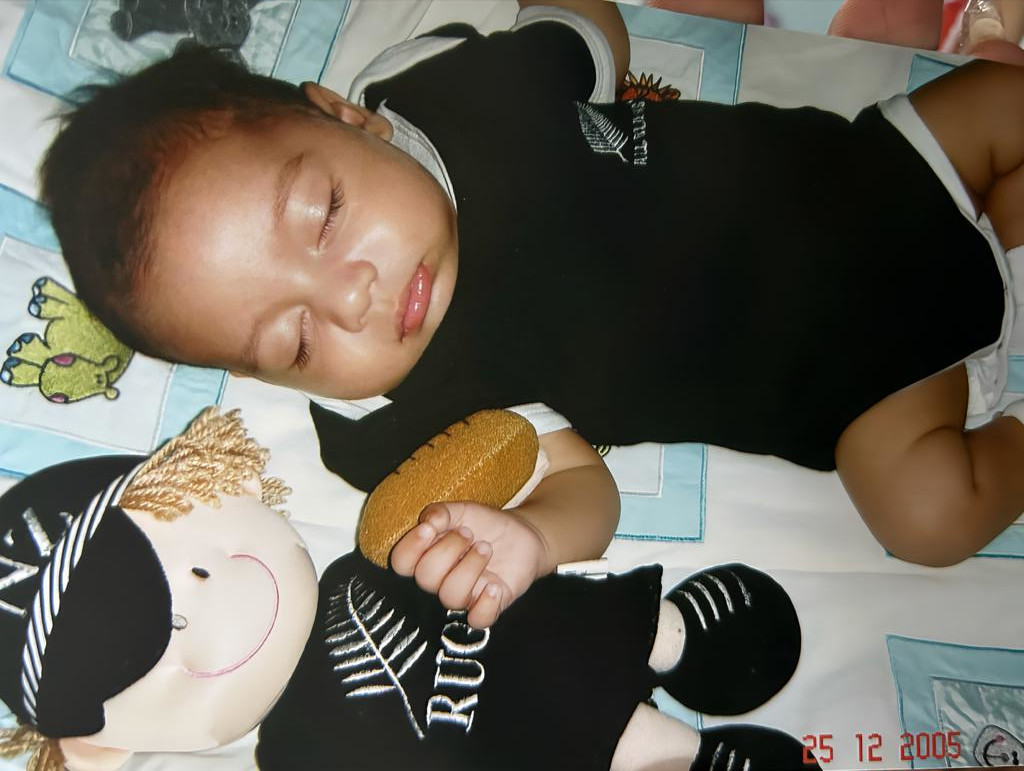
A few weeks before Jake’s birth, I had extremely strong contractions. I felt they were unusual signs, but the doctor reassured me that everything was fine.
Still, my gut feeling told me that there was something amiss. Upon inducing labour at 42 weeks, we discovered that Jake was in a breech position, and I needed to undergo an emergency C-section. My recovery was extremely painful — I could not walk straight or toilet myself and was in tears. It was hard to care for Jake the way I wanted to, to hold him, to breastfeed him…. I felt lost and so alone. Yet this was only the beginning of my nightmare.
Jake’s APGAR (appearance, pulse, grimace, activity, respiration) scores were normal, and although the paediatrician stated that he was healthy, there were so many signs that things were not quite right. He was having trouble latching and sucking, unable to keep milk down, and could not settle to sleep, crying most of the time.
My concerns were — again — dismissed during this stage.
(See also: PRENATAL SCANS AND TESTS FOR YOUR PEACE OF MIND WHEN PREGNANT)
From Inconclusive to Heartbreak
We consulted with another paediatrician, who suspected autism as Jake was unable to maintain eye contact. We then sought a third opinion, and she was a wonderfully kind neurologist who performed lengthy assessments, discovering congenital cataracts in both eyes, which explained his lack of eye contact. At just six months old, Jake underwent two surgeries to remove the cataracts, one eye at a time, six weeks apart.
In the meantime, Jake struggled with his vision and missed all the major milestones in his fourth month. By then, he was also experiencing approximately 1000 seizures a day. It was at this stage that our worlds were truly turned upside down.
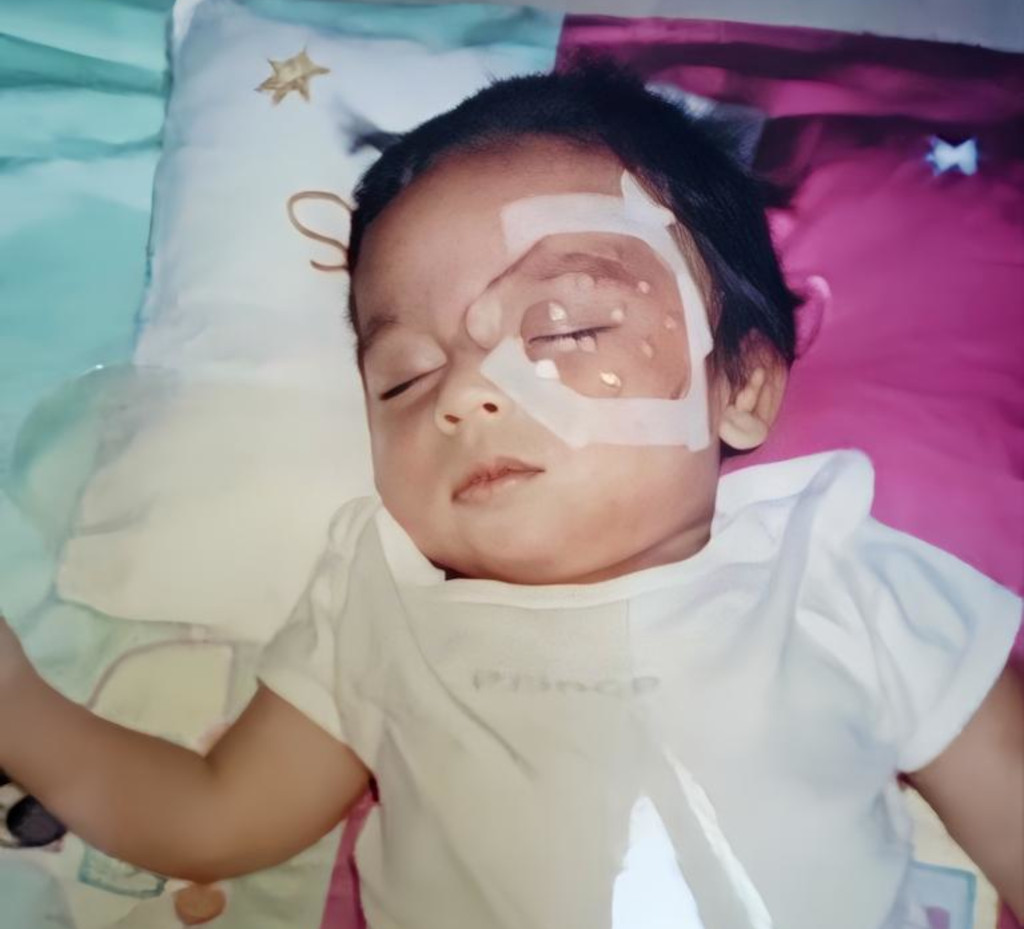
Doctors put Jake through a battery of tests — blood tests, EEGs (electroencephalograms), spinal taps, and MRIs. It was a traumatising period for Jake and heartbreaking for the whole family to watch our little one be poked and prodded. The tests came back inconclusive.
Since the tests were inconclusive, Jake was unofficially diagnosed with Global Developmental Delay and Epilepsy. This is a general, unspecified diagnosis typically provided to children below the age of five. He was also suspected to have cerebral palsy. These terms all sounded so foreign and scary.
It was only in 2020, when Jake was 13, that a series of new genetic tests revealed his true diagnosis. He was diagnosed with NACC1, a rare genetic mutation which is not inherited. Not much is known about this mutation; to date, there are only approximately 50 kids across the globe with this condition.
NACC1 is characterised by congenital cataracts, epilepsy, involuntary movements, and periods of hyperactivity followed by hypoactivity. The condition also affects a child’s ability to eat, speak, and move, while their cognition and intelligence are above average.
(See also: MY BABY WAS THE 7TH TAPVR PATIENT IN SINGAPORE’S HISTORY)
From Devastation to Determination
Nothing could have prepared me for the news that my child would probably never be able to walk, talk or live a long life. My entire world collapsed. Tears flowed continually, and it felt like an endless stream. Despite this, I had to muster strength for Jasmine, who was merely nine at the time.
Those days were a chaotic mix of anger, grief, sadness, and fear. The fatigue was overwhelming, intensified by Jake’s sleepless nights. Any chance of daytime rest was filled with either therapy sessions or hospital visits.
Endless worry and frustration continued to fill the next few years as Jake was unable to perform the usual activities of feeding, sleeping, and moving, and would need help with his bowel movements.
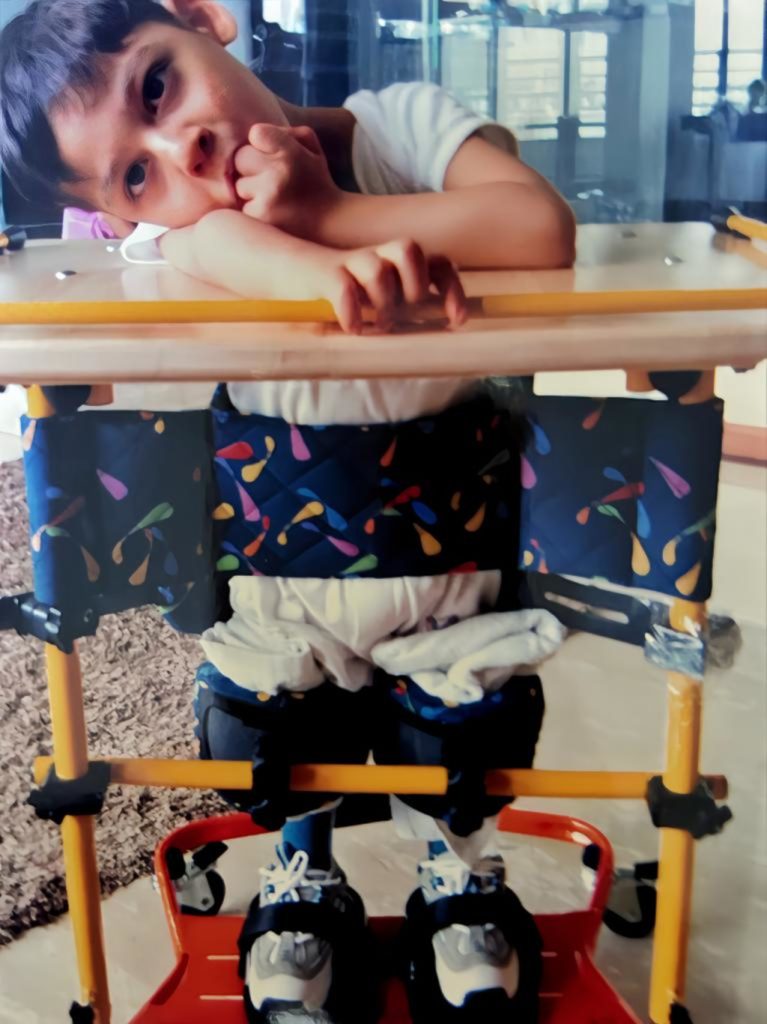
However, I was determined not to accept Jake’s prognosis, so I searched relentlessly for solutions. Our journey first led us to Philadelphia, USA, where we immersed ourselves in an intensive two-year Glenn Doman programme. We also travelled to Poland, China, and South America, embarking on hundreds of intensive and avant-garde therapies. The remarkable progress we observed in Jake and other kids during these was truly inspiring.
110 intensives over 10 years opened my eyes to a whole new world of hope. Over the years, I studied and certified myself in order to help Jake. Eventually, I decided to bring the therapies back home to bring hope to other special needs kids and parents in Singapore and the region.
(See also: 12 THINGS TO KNOW WHEN YOU HAVE A CHILD ON THE AUTISM SPECTRUM IN SINGAPORE)
From Pain to Purpose
Using WINGS as a platform, I wanted to challenge the ideologies surrounding our special needs community locally. Firstly, we put our ‘normal’ kids through tons of tuition to get into top schools — why don’t we challenge our special kids to achieve more? And secondly, why were we not trying to avoid painful surgeries with the simple concept of movement?
To achieve this, I made a lot of sacrifices. I left my senior position in a branding agency and we sold our home to fund this. In November 2017, WINGS Therapy & Learning Center opened its doors. Our mission is to challenge the special needs community to aim for a better life, whatever that may look like. Don’t our special kids deserve that from parents, educators, doctors, therapists, and caregivers?
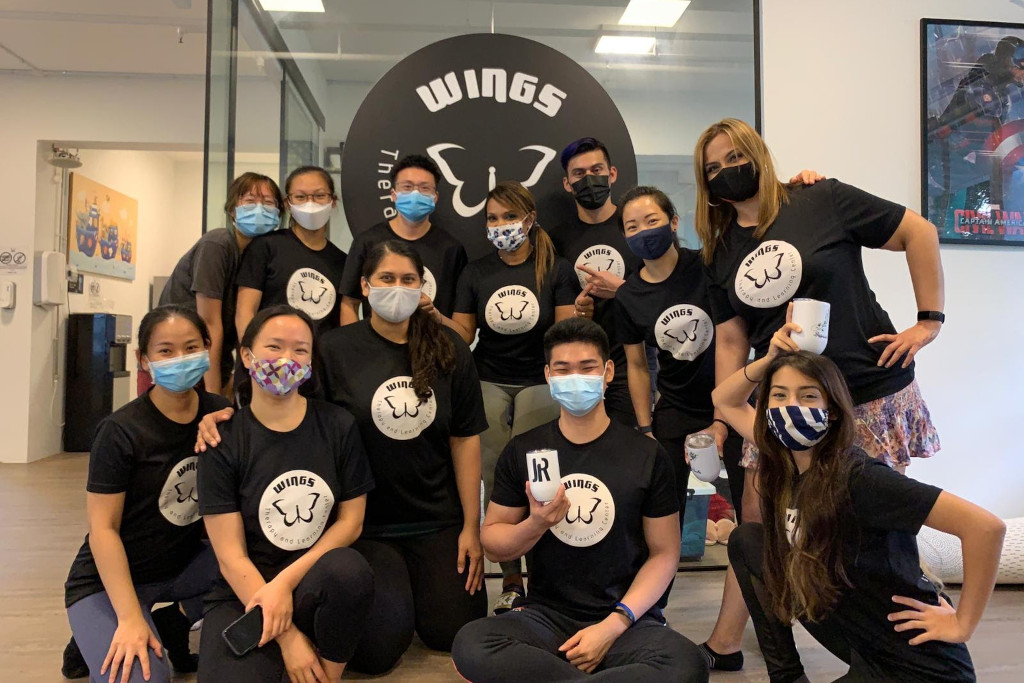
What sets WINGS apart from other physiotherapy providers is that we are the first centre in Asia and the only one in Singapore to follow the Intensive Model of Therapy (IMOT) framework. It focuses on consistency, intensity, and duration — areas in which traditional therapy tends to be lacking. Specially trained therapy assistants are also present in every session to assist and ensure the safety of the child.
Research demonstrates that intensive therapy, which can vary from two to four hours a day over three weeks, can help improve mobility and self-care even among older children and adolescents with cerebral palsy, as well as those with more severe conditions.
As of 2024, WINGS has impacted over 6,000 special needs infants, kids, and youths across Asia. We support babies as young as three months of age and aim to continue broadening our reach to every child who would benefit from our services. To this end, we launched the Jake Kristian Foundation: WINGS FOR GOOD programme this year to provide subsidised therapy rates to families who are otherwise unable to afford private therapy.
(See also: WHAT HAPPENS IF MY DOWN SYNDROME KID GROWS UP WITHOUT APPROPRIATE TREATMENTS AND THERAPIES?)
From Trials to Blessings
Jake is now 18 and our sadness and fears have dissipated. But most of all, I now know that Jake came into our lives to make the world a better place. He has no enemies, only friends. No harsh words, only love. He carries no resentment and quickly forgives. His smiles light up the room, his joy is contagious, and his life is a gift.
Although Jake may not have achieved all his physical developmental milestones, his capacity to love without any discrimination is amazing, and his positivity is powerful. He could endure three days of no sleep and a series of seizures and come out with a smile once the storm passes. You don’t see that in an average person.
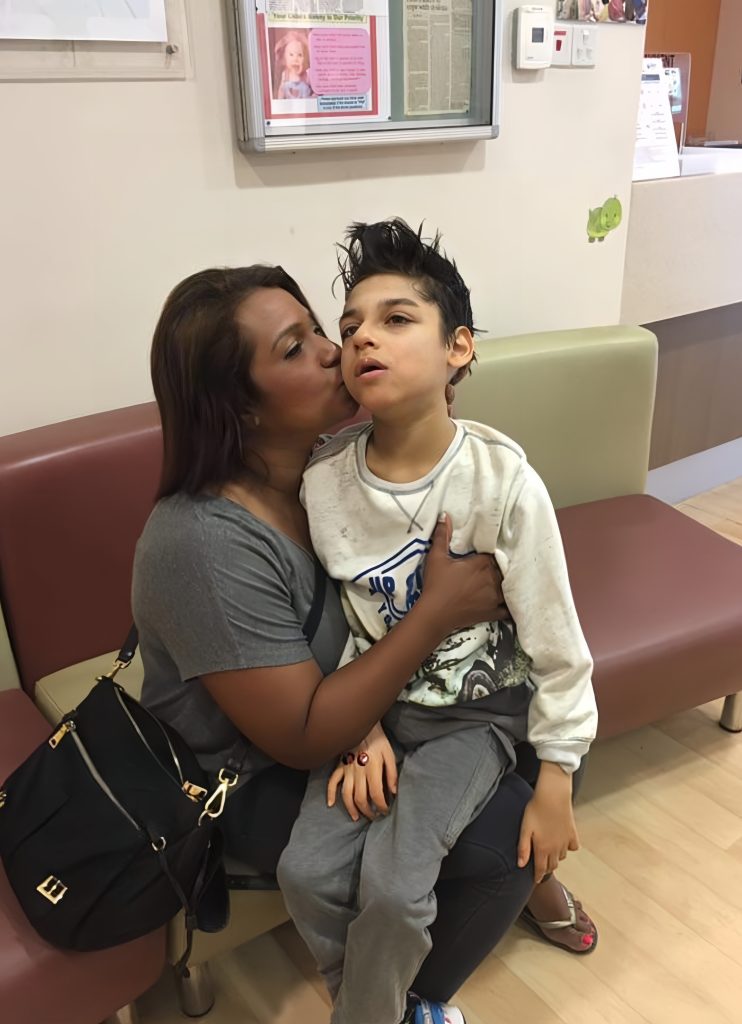
In many ways, Jake is your average teenager. He loves fashion, music, socialising, and having fun. He hates therapy and studying and is always on the lookout for an opportunity to skip ‘school’. His brother borrowing his clothes is a no-no, but he loves being the centre of attention, especially from pretty girls.
I hear this a lot: God only gives you what you can handle. Yet there were moments I wondered how I would make it through alive. I would ask, ‘What lessons can I learn, when everything hurts so much? Why are you letting these things happen to me and my child?’ Now looking back, I realise I’ve grown tremendously. I no longer think, ‘why me?’ because now I know.
God knew that I would be the best mother for Jake, and he the best son for me. Jake is nothing short of a blessing. His trials have opened a world of possibilities for thousands of kids across Asia.
(See also: BORN DEAF, MY CHILD IS NOW BREAKING BARRIERS IN MUSIC)
From Child to Teacher
Throughout the past 18 years, Jake has imparted invaluable life lessons to me — lessons I might not have encountered in the corporate world or as a normal parent. Here are some of them:
Jake is a true superhero. My son goes through so much daily and wakes up every morning with a smile. He has to endure hours of hard therapy and complications but does so happily.
Be grateful for your health. Every seemingly effortless action we do takes significant effort for a child with special needs. It’s not until you watch somebody else struggling to do what are simple everyday tasks for most of us that you understand the privilege of being born healthy.
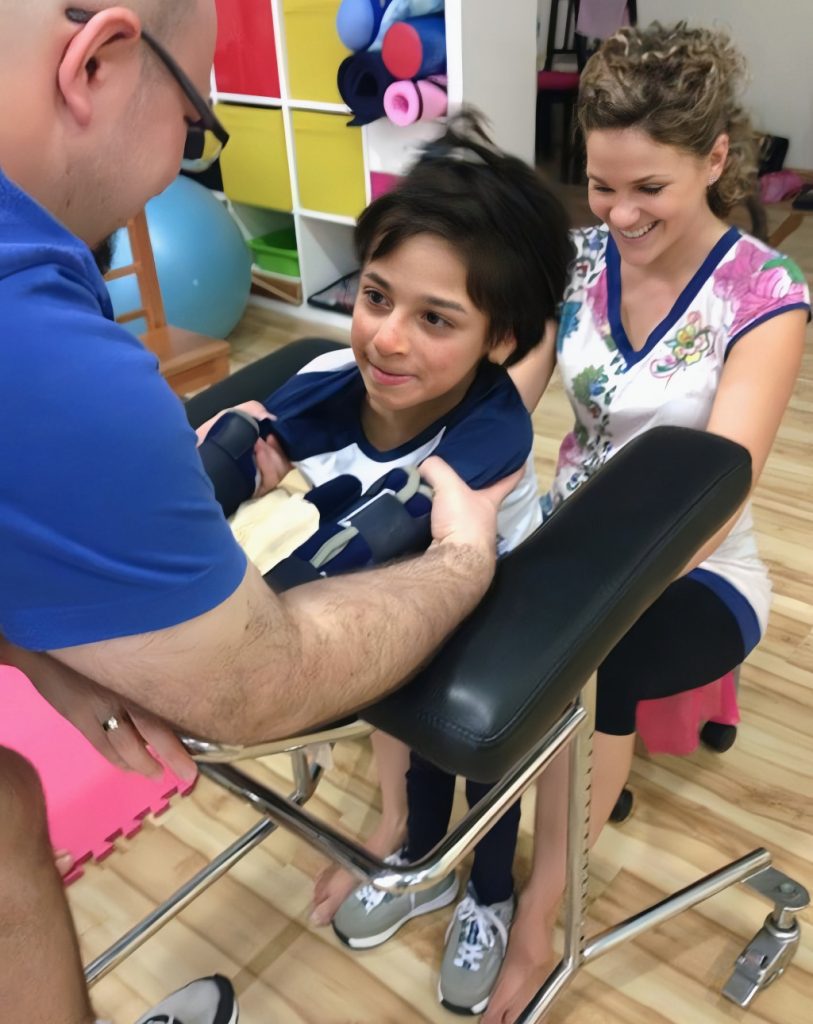
Don’t take things for granted. I am proud of my child. We celebrate the little things most parents would not think twice about. Every birthday is an achievement — another precious year of just having him here.
We don’t need sympathy. We are not ashamed of Jake. In fact, we want him others to treat him like a regular person because that’s what he is. That said, we do want to spread awareness about being more inclusive of people with disabilities.
Perfection is a myth. Growing up as the eldest daughter in a strict Asian-Indian family, expectations were high — striving for straight A’s and staying out of trouble. Through my son, I learned how detrimental the struggle for perfection can be to ourselves, as well as our children. Today, my goal is to embrace imperfection. We’re not meant to excel in every aspect; true success lies in discovering our innate talents and passions.
(See also: 10 THINGS I’VE LEARNT FROM HAVING A CHILD WITH DOWN SYNDROME)
True happiness is simplicity. We chase things like wealth, fame, or a fancy Ivy League education because we have complicated what happiness means for ourselves. It’s the simplest things that bring us true joy.
Isolation is a natural part of a special parent’s journey. The worst part of it is that it is no one’s fault. It’s reality. There is even a natural progression to it as our kids get older. While other parents juggle sports, dance, and gymnastics, our lives revolve around doctors, procedures, and therapies. Our paths no longer cross.
Treasure those who stick around. It takes effort to be friends with a special needs mum. It is much easier to maintain friendships with mums you can relate to. It’s a sad fact. So, we treasure the family and friends that have stuck through this journey with us.
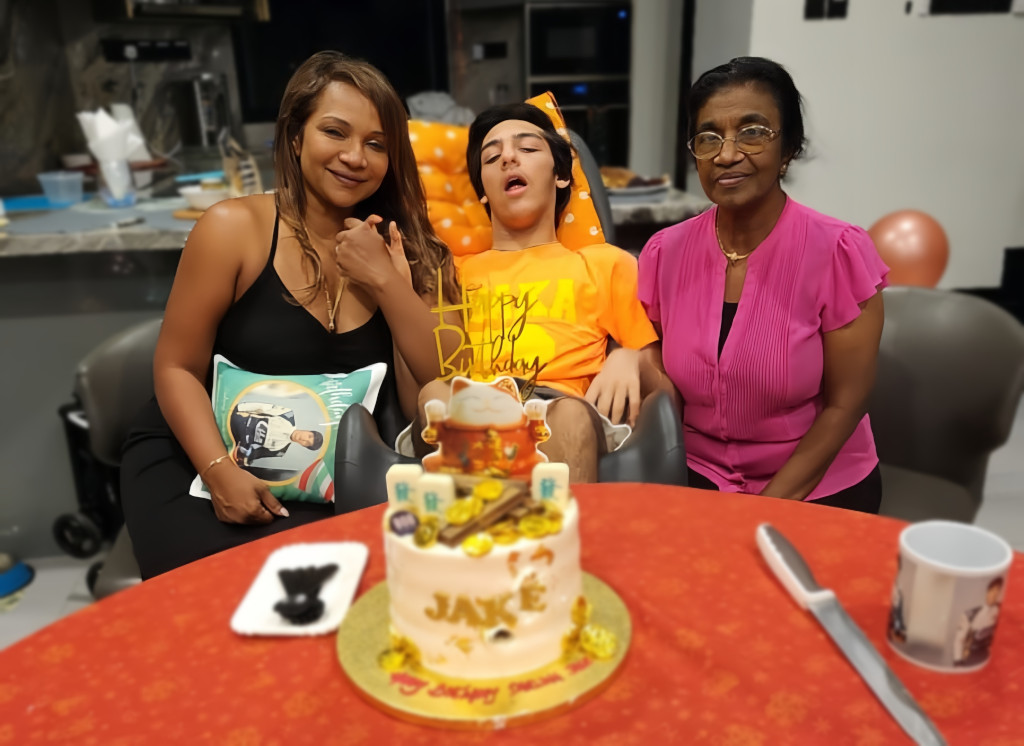
I have been so blessed with all the right support from the outset. They say it takes a village and it certainly has.
My parents relocated to Singapore right before Jake was born and stepped in to support us from the beginning. They spent hours teaching him to feed through a feeding tube and helped care for my two other kids for most of Jake’s travels. My father passed in 2022, but my mother continues to support Jake with much love while I work.
My husband works right by my side at WINGS, treating children in therapy. He is an incredibly talented and passionate therapist, and we work hand in hand to find new solutions for Jake and all the kids who walk through our doors.
After assisting in Jake’s care from birth, Jasmine, who graduated with a psychology degree, has taken on multiple roles at WINGS since its inception. Now 26, she manages our marketing and business development.
Finally, our 16-year-old Tommie has been volunteering at WINGS since he was 11, and he is great at making our community of kids feel included and seen.
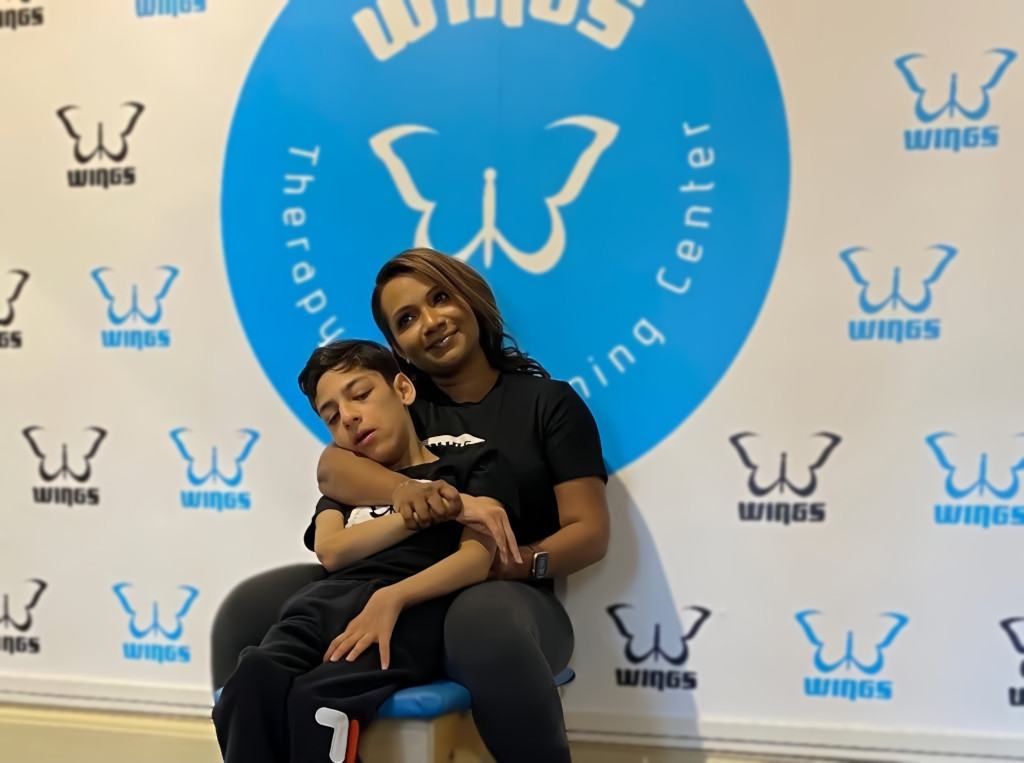
From Here On Out
My greatest hope for Jake is happiness and health. As medicine advances, I hope that a gene therapy emerges that would help alleviate his symptoms. I want him to live a life free of pain, so we keep going and working towards that.
I also hope that we evolve into a more inclusive society that recognises my child and all our special kids as humans. Individuals who deserve acceptance, friendships, schooling, sports, love, and relationships.
If you’re not a special needs mum, I simply ask that you don’t forget about us. More than ever, we need your friendship. Perhaps reach out to a friend with a special child, acknowledge their child, and teach your child to embrace friendships with special kids.
Last but not least, we urge parents to reach out for help as soon as you suspect something is amiss. As mothers, we share a powerful connection with our babies, so trust your instinct and get an assessment done.”
(See also: TEACH YOUR PRESCHOOLER TO BE INCLUSIVE & EMBRACE DIVERSITY)
All content from this article, including images, cannot be reproduced without credits or written permission from SingaporeMotherhood.
Follow us on Facebook, Instagram, and Telegram for the latest article and promotion updates.





